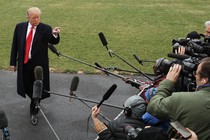They Really Mean It
5 min read
Gavin McInnes, a co-founder of the Proud Boys, was extremely upset with me. He started listing things that I should feel (ashamed and terrible about myself) and that he wished would happen to me (trouble sleeping at night). “You should,” he told me gravely and slowly, as though he were about to give me some very important advice, “slit your wrists.”
The transgression I’d committed against him was being a journalist in his presence. I had just been introduced to McInnes at table 49 of the New York Young Republicans Club annual gala when he started laying into me. I hadn’t even had the chance to ask him any questions. Several minutes later, he got into an argument with a New York Times reporter, whose notebook he grabbed and surreptitiously passed to another guest before storming off.
I hadn’t come to get yelled at (though had I anticipated this happening). I’d done so because the event has become one of the most prominent gatherings in MAGA world, where fringe online trolls and members of far-right parties from across the world hang out with the GOP’s power brokers. Two prominent members of the incoming Trump administration—Dan Scavino Jr., soon to be the deputy chief of staff, and senior adviser Corey Lewandowski—spoke at the event. Donald Trump’s former attorney-general nominee, Matt Gaetz, milled around in the crowd. (After attending in person last year, Trump delivered remarks via phone this time around, in addition to a prerecorded video address in which he praised Gavin Wax, the club’s president.)
The theme of the evening was revenge: During the forthcoming Trump administration, various speakers said, there would be hell to pay. Enemies of the state would be arrested and put in jail, or deported. The intensity of McInnes’s disdain for the media was an outlier, but only barely. The media and Democrats “need to learn what populist nationalist power is on the receiving end,” Steve Bannon, the former Trump adviser, said onstage in his keynote speech. “I mean investigations, trials, and then incarceration.” Trump, he said, “has got a kind heart and big soul. But that’s not us, right? We want retribution.”
It would be tempting to write off this rhetoric as the ramblings of a fringe faction of the right—and with provocateur influencers such as Jack Posobiec, James O’Keefe, and Martin Shkreli in attendance, the fringe was there. But throughout the night, other speakers closer to the establishment spoke about their desire for vengeance, sometimes directed at the media and other times at immigrants, Democrats, and even the homeless. “I think we need more Daniel Pennys in this country, because we have far too many Jordan Neelys,” incoming Representative Brandon Gill said during his remarks onstage, referring to the 26-year-old who had recently been acquitted of criminally negligent homicide after putting Neely in a fatal chokehold. (Neely, a homeless man with a history of mental illness, was reportedly threatening passengers on the subway.) Gill continued his speech by saying that Congress’s success would be determined by the number of “illegal aliens that we deport over the next two years.”
Trump and his supporters haven’t exactly been quiet about their fantasies and promises. Trump talked about mass deportations all throughout the campaign, and has doubled down since his victory. But there is a meaningful difference between being aware of the rhetoric and truly experiencing its full force. As a reporter who covers the far-right internet, I’ve seen countless posts from people like Gill and Bannon talking about deporting as many immigrants as possible or incarcerating Democrats and the press. But to hear these men fervently say it and watch a crowd of more than 1,000 erupt into cheers and laughter in response added a new dimension. They don’t just want policies, and they’re not just shitposting to provoke people online; they want their enemies to suffer, and they want to relish in their pain. “Reckoning is coming, and there will be retribution and there will be accountability,” Lewandowski said onstage. “And that accountability will be to the highest levels.”
Seeing MAGA in person also betrays other hints of the direction the party will take in Trump’s second term. Members of several far-right European parties were in the crowd. “We have many friends in the New York Young Republican Club,” Martin Kohler, the chairman of the Berlin youth wing of Germany’s Alternative für Deutschland (AfD) told me, explaining that his party had hosted Wax in Berlin. “They invited us to come over for the gala.” The politically ascendant AfD is among Germany’s furthest-right parties. Although it disputes allegations that it is a neo-Nazi party, many of its members have been outed as having ties to neo-Nazis. They have reportedly discussed “remigration,” the process of deporting nonwhite residents, including naturalized citizens and their descendants. (Trump used this term in a Truth Social post in September). Sam Venis, another journalist in attendance, told me that he met several people at the gala who said that they were members of the Forum for Democracy, a far-right party in the Netherlands whose leader has also advocated for “mass remigration” so that Europe does not “Africanize” and instead remains predominately white. The gala closed with a speech from Miklós Szánthó, the director-general of the Center for Fundamental Rights, an organization in Hungary that supports Viktor Orbán, the country’s authoritarian prime minister.
The presence of these European far-right parties was fitting. They have rallied around punishing their enemies by “reclaiming” their country from immigrants and the cosmopolitans they think have taken it over: They want revenge. Once Trump takes office, the MAGA right will begin to exact it. “Tonight, for me, is a night of hope,” Kohler said. “Here in the U.S., something is about to change.”



